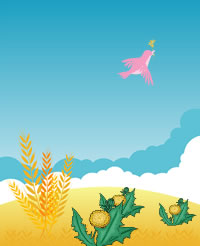
16th Sunday in Ordinary Time Year A
Once again our reading from Matthew’s gospel brings us the teaching of Jesus about ‘the Kingdom’, in parable form. As before, the parables are invitations to learn what the coming of God’s liberating and life giving reign should mean for us. Though our situation is very different from that of those who first heard these parables, they have a clear message for the Church of today. The gospel truth speaks to all ages. Wheat and weeds growing together – a perfect image, surely, of the world in which we live. How should Christians react in this situation?
While we must speak out for the truth, we may well be tempted to emphasise our faithfulness by our impatience and intolerance towards those who do not journey with us. The parable of Jesus warns us that this is not God’s way. The reading from the book of Wisdom shows us that, as the Old Testament was drawing to a close, devout thinkers in old Israel were recognising that ‘the virtuous person must be kindly to others’, learning from the mysterious patience of God. Only the Lord of the harvest – whose grace is at work in a hidden way in every human heart – can sort out the good from the bad when all is gathered in at the end. We who are blessed with the gift of faith must prepare for the final harvest by becoming an exemplary crop ourselves. There is a lesson here, also, for those who belong to the new movements emerging in the today’s Church. They must avoid a sectarian spirit that would see their way as the only way. There is room in God’s Church for many spiritualties and traditions. True ‘catholicity’ shows an openness to this.
The other parables carry us further. ‘The Kingdom is upon you’, Jesus has announced. In the parable of the tiny mustard seed, he refers to the modest inauguration of the Kingdom. His hearers must have been puzzled, as they saw the teacher who spoke with spellbinding power gathering twelve of his followers to symbolise the New Israel. Few of these followers had much to commend them, and some would have been considered positively disreputable. Jesus, however, is carrying forward the mission he has been given by the Father. He looks confidently beyond these humble beginnings, and he urges those ‘who have ears to hear’ to share his confidence: ‘No need to be afraid, little flock’, he tells this unpromising group, ‘for it has pleased your Father to give you the Kingdom’ (Lk 12:32). And those for whom Matthew wrote could already see faith in the Kingdom announced by Jesus spreading beyond the boundaries of Palestine. As they heard the parable of the seed that became a tree sheltering the birds of the air, they could recall that more than one of the prophets used the same image, speaking of the worldwide reign of God that was to come (cf. Dan 4, Ezek 17 and 31). As the Church’s new era of evangelisation makes a faltering start, we too must take heart from the message of the parable. ‘God chooses the weak to shame the strong’ (1 Cor 2:27).
The parable of the yeast tells of the hidden designs of God being worked out in the chaos of history. Though we are all tempted to judge by appearances, we recognise that the good things that happen in our own faith communities are usually the fruit of long years of fidelity and generosity. ‘Three measures of flour’ would have made something like three dozen gallons of dough ready for baking! Though God’s designs are hidden, they are boundless in their promise. The explanation of the mixed harvest parable – an addition of early Christian teachers – warns those within the Church who are unfaithful to their calling that they must be converted.
John Thornhill sm

